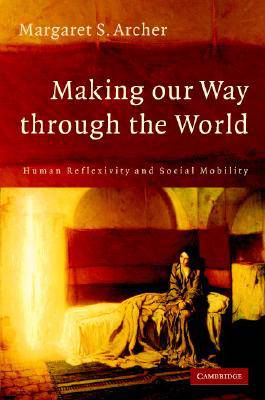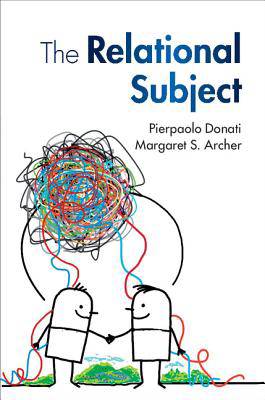
- Retrait gratuit dans votre magasin Club
- 7.000.000 titres dans notre catalogue
- Payer en toute sécurité
- Toujours un magasin près de chez vous
- Retrait gratuit dans votre magasin Club
- 7.000.0000 titres dans notre catalogue
- Payer en toute sécurité
- Toujours un magasin près de chez vous
Livres écrits par Margaret S Archer
-
The Reflexive Imperative in Late Modernity
Margaret S Archer
- Livre broché | Anglais
- This book completes Margaret Archer's trilogy investigating the role of reflexivity in mediating between structure and agency. What do young people wa... Savoir plus
72,45 €Livraison 2 à 3 semaines72,45 €Livraison 2 à 3 semaines -
The Reflexive Imperative in Late Modernity
Margaret S Archer
- Livre relié | Anglais
- This book completes Margaret Archer's trilogy investigating the role of reflexivity in mediating between structure and agency. What do young people wa... Savoir plus
138,45 €Livraison 2 à 3 semaines138,45 €Livraison 2 à 3 semaines -
Making Our Way Through the World
Margaret S Archer
- Livre relié | Anglais
- How do we reflect upon ourselves and our concerns in relation to society, and vice versa? Human reflexivity works through 'internal conversations' usi... Savoir plus
149,95 €Livraison 2 à 3 semaines149,95 €Livraison 2 à 3 semaines -
Making Our Way Through the World
Margaret S Archer
- Livre broché | Anglais
- How do we reflect upon ourselves and our concerns in relation to society, and vice versa? Human reflexivity works through 'internal conversations' usi... Savoir plus
77,95 €Livraison 2 à 3 semaines77,95 €Livraison 2 à 3 semaines -
The Relational Subject
Pierpaolo Donati, Margaret S Archer
- Livre relié | Anglais
- Many social theorists now call themselves 'relational sociologists', but mean entirely different things by it. The majority endorse a 'flat ontology',... Savoir plus
161,45 €Livraison 2 à 3 semaines161,45 €Livraison 2 à 3 semaines -
The Relational Subject
Pierpaolo Donati, Margaret S Archer
- Livre broché | Anglais
- Many social theorists now call themselves 'relational sociologists', but mean entirely different things by it. The majority endorse a 'flat ontology',... Savoir plus
64,95 €Livraison 2 à 3 semaines64,95 €Livraison 2 à 3 semaines -
Realist Social Theory
Margaret S Archer
- Livre relié | Anglais
- Margaret Archer develops here her morphogenetic approach, heralded in Culture and Agency (CUP, 1988), and applies it to the problem of structure and a... Savoir plus
206,45 €Livraison 2 à 3 semaines206,45 €Livraison 2 à 3 semaines -
Transcendence
Margaret S Archer, Andrew Collier, Douglas V Porpora
- Livre relié | Anglais | Critical Realism: Interventions (Routledge Critical Realism)
- The book explores religious experience as a justifiable reason for religious belief, demonstrating that the three pillars of Critical Realism - ontolo... Savoir plus
305,45 €Livraison 2 à 3 semaines305,45 €Livraison 2 à 3 semaines -
Morphogenesis Answers Its Critics
Margaret S Archer
- Livre relié | Anglais
- In this final book by renowned sociologist Margaret S. Archer, her groundbreaking morphogenetic approach is defended, refined and extended through a s... Savoir plus
158,95 €Livraison 2 à 3 semaines158,95 €Livraison 2 à 3 semaines -
Transcendence
Margaret S Archer, Andrew Collier, Douglas V Porpora
- Livre broché | Anglais | Critical Realism: Interventions (Routledge Critical Realism)
- Atheism as a belief does not have to present intellectual credentials within academia. Yet to hold beliefs means giving reasons for doing so, ones whi... Savoir plus
94,95 €Livraison 2 à 3 semaines94,95 €Livraison 2 à 3 semaines -
Being Human
Margaret S Archer
- Livre broché | Anglais
- The human subject is under threat from postmodernist thinking that has declared the "Death of God" and the "Death of Man." This book is a revindicatio... Savoir plus
50,45 €Livraison 2 à 3 semaines50,45 €Livraison 2 à 3 semaines -
Being Human
Margaret S Archer
- Livre relié | Anglais
- The human subject is under threat from postmodernist thinking that has declared the "Death of God" and the "Death of Man." This book is a revindicatio... Savoir plus
121,45 €Livraison 2 à 3 semaines121,45 €Livraison 2 à 3 semaines -
Realist Social Theory
Margaret S Archer
- Livre broché | Anglais
- Margaret Archer develops here her morphogenetic approach, heralded in Culture and Agency (CUP, 1988), and applies it to the problem of structure and a... Savoir plus
95,45 €Livraison 2 à 3 semaines95,45 €Livraison 2 à 3 semaines
13 sur 13 résultat(s) affiché(s)

















